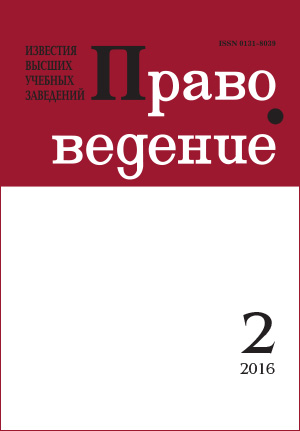Renaissance understanding of dignity and its influence on the modern concept of human rights
Abstract
According to the author, the Renaissance has had a significant impact on the development of the Western civilization in the field of jurisprudence. Among other things, it has formulated a new concept of human dignity the essence of which is the ability to take any image. In the most concentrated manner this concept was outlined in the work of Pico della Mirandola “Oration on the Dignity of Man”. The essence of the Renaissance is a fusion of the already mature Christian tradition with the re-opened ancient heritage. In particular, the Renaissance linked the idea of God-likeness of a person with the idea of omnipresence of the God: being godlike, the person can be present in all things (though not in all at once). This link forms the dignity in its new sense. The religious origin of the dignity is a key to understanding many important characteristics of human rights. It explains the lack of rationales of human rights; their claims to absolute priority; their proliferation; the helplessness of law in regard to acts undermining the foundations of social existence and labeled as self-realization acts. Human rights formalize and typify public relations and, more generally, transform the human being which ceases to be a destiny defined by objective circumstances and personal choice and becomes a realization of law. In addition, human rights focus on opportunities rather than on their implementation; as a result, lawmaking and advocacy are aimed not at defending values, but at defending their probability. Some authors subjected the Renaissance concepts to the criticism; their alternative, however, can be found only beyond the positive law and only under certain historical conditions.
Keywords:
Renaissance, theology, natural law, international law, human rights
Downloads
References
Downloads
Published
How to Cite
Issue
Section
License
Articles of "Pravovedenie" are open access distributed under the terms of the License Agreement with Saint Petersburg State University, which permits to the authors unrestricted distribution and self-archiving free of charge.




